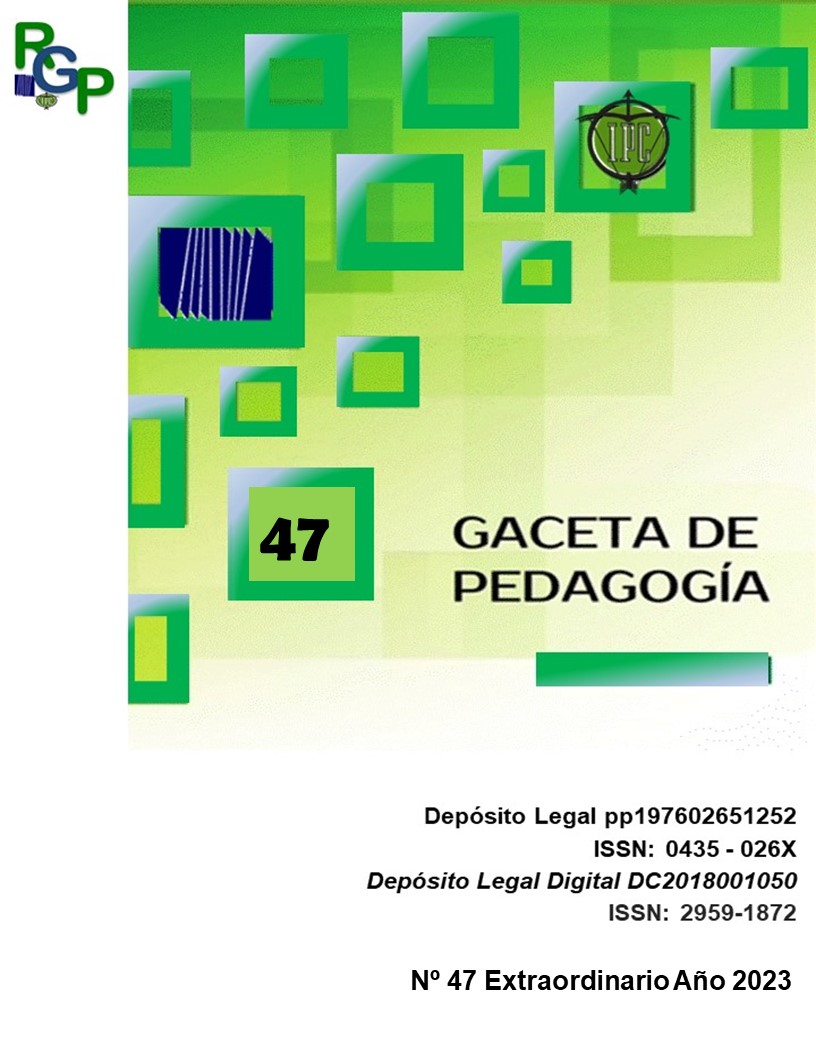Pedagogical content knowledge for the teaching of the nature of science and teaching praxis
DOI:
https://doi.org/10.56219/rgp.vi47.2342Keywords:
Nature of Science, Pedagogical Content Knowledge, Investigation actionAbstract
The construct “Nature of Science” is fundamental in citizens' scientific literacy. However, its complexity has been an obstacle to its adequate treatment in the classroom. To overcome this problem, an educational process based on “Pedagogical Content Knowledge” was carried out in the Natural Sciences courses of the Department of Biology and Chemistry, of the Pedagogical Institute of Caracas with an Action Research design, the participants being a group of teachers and their respective students. The narrative analysis of first-order action research allowed us to infer that the development of pedagogical content knowledge causes future teachers to modify their beliefs about teaching and build pedagogical knowledge. The second-order research explains that action research turned out to be an ideal framework to self-reflect on praxis and transform it, generate professional development and acquire investigative maturity.
References
Abd-El-Khalick, F. y Lederman, N. (2000). Improving Science Teachers' Conceptions of
Nature of Science: A critical review of the literature. International Journal of Science Education, 22(7), 665–701.
Acevedo, J. (2009). Enfoques Implícitos versus Explícitos en la Enseñanza de la Naturaleza de la Ciencia. Revista Eureka sobre Enseñanza y Divulgación de las Ciencias, 6(3), 355-386.
Acevedo, J., García, A. y Aragón, M. (2017). Enseñar y Aprender sobre la Naturaleza de la Ciencia mediante el Análisis de Controversias de Historia de la Ciencia: Resultados y conclusiones de un proyecto de investigación didáctica. Organización de Estados Iberoamericanos para la Educación, la Ciencia y la Cultura: España.
Bennásar, A., Vásquez, A., Manassero, M. y García-Carmona, A. (2010). Ciencia, Tecnología y Sociedad en Iberoamérica: una evaluación de la comprensión de la naturaleza de la ciencia y tecnología. Madrid: Centro de Altos Estudios Universitarios de la OEI.
Betancourt, C., Delgado, M. y Añez, E. (2016). La Investigación Acción como Estrategia para el Desarrollo Profesional Docente: Una experiencia en enseñanza de la química. Educab Revista de Educación, 7 (7), 5-21.
Cobo-Huesa C., Abril A. y Ariza, M. (2021). Investigación basada en el Diseño en la Formación Inicial de Docentes para una Enseñanza Integrada de la Naturaleza de la Ciencia y el Pensamiento Crítico. Revista Eureka sobre Enseñanza y Divulgación de las Ciencias, 18 (3), 15-35.
Faikhamta, C. (2013). The Development of In-Service Science Teachers’ Understandings of and Orientations to Teaching the Nature of Science within a PCK-Based NOS course. Science Education, (43), 847–869.
Furman, M. y De Podestá, M. (2009). La Aventura de Enseñar Ciencias Naturales. Aique: Buenos Aires.
Gil Pérez, D. y Vilches, A (2006). Educación Científica y Alfabetización Científica: Mitos y realidades. Revista Iberoamericana de Educación, 42, 31-53.
Hanuscin, D., Lee, M. y Akerson, V. (2010). Elementary Teachers’ Pedagogical Content Knowledge for Teaching the Nature of Science. Science Education (95). https://acortar.link/vel2vr
Hurd, D. (1998). Scientific Literacy: New minds for a changing world. Science Education, 82 (3), 407-416
Holbrook, J. y Rannikmae, M. (2007) The Nature of Science Education for Enhancing Scientific Literacy. International Journal of Science Education, 29 (11), 1347-1362
Holbrook, J. y Rannikmae, M. (2009) The Meaning of Scientific Literacy. International Journal of Environmental & Science Education, 4 (3), 275-288
Kemmis, S., Mc Taggart, R. y Nixon, R. (1988). The Action Research Planner (3a.ed.). Geelong: Deakin University.
Lederman, N. (2006) Research on Nature of Science: Reflections on the past. Anticipations of the future. Asia-Pacific Forum on Science Learning and Teaching, 7(1), 101-132.
Martínez, M., Pérez, M., Ojeda, E. y Ascanio, A. (2016). Visión Epistemológica de la Ciencia en la Praxis Pedagógica: un estudio longitudinal con docentes de las maestrías en Enseñanza de la Biología y la Química. Revista de Investigación, 40 (89), 123-138.
Martínez, M., Pérez, M; Ojeda, E. y Ascanio, A. (2017). Visión epistemológica de la ciencia que prevalece en la praxis pedagógica de docentes cursantes de las maestrías en enseñanza de la biología y en enseñanza de la química un estudio longitudinal. Revista de Investigación, 42(93), 37-53
McComas, W. (2014) Keys to Teaching the Nature of Science. The Science Teacher, 71(9), 24-27
Mellado, V. (2001) ¿Por qué a los Profesores de Ciencias nos Cuesta Tanto Cambiar Nuestras Concepciones y Modelos Didácticos? Revista Interuniversitaria de Formación del Profesorado, 40, 17 – 30.
National Academies of Sciences, Engineering, and Medicine (2015). Science Teachers' Learning: Enhancing opportunities, creating supportive contexts. Washington, DC: The National Academies Press
Organización para la Cooperación y el Desarrollo Económico-OECD (2019). PISA 2018. Results (Volume I): What Students Know and Can Do. OECD Publishing, Paris
Schneider, R. y Plasman, K. (2011). Science Teacher Learning Progressions: A review of science teachers. Review of Educational Research, 81(4), 530-565
Shulman, L. (2005). Conocimiento y Enseñanza: Fundamentos de la nueva reforma. Profesorado. Revista de currículum y formación del profesorado, 9, 2. Traducción del original: Knowledge and Teaching. Harvard Educational Review 1987, 57(1), 45.
Shulman, L. (2019). Aquellos que Entienden: Desarrollo del conocimiento en la enseñanza. Revista de Curriculum y Formación del Profesorado. 23(3) 269-295. Traducción del original: Those Who Understand: Knowledge Growth in Teaching. Educational Researcher 1986, 15(2), 4-14
Suwono, H., Maulidia, L., Saefi, M., Kusairi, S. y Yuenyong C. (2022). The Development and Validation of an Instrument of Prospective Science Teachers’ Perceptions of Scientific Literacy. EURASIA Journal of Mathematics, Science and Technology Education, 18 (1), 1- 16.
Whitehead, J. (2009). Generating Living Theory and Understanding in Action Research studies. Action Research, 7 (1), 84-99.
Wolfensberger, B. y Canella, C. (2015) Cooperative Learning about Nature of Science with a Case from the History of Science. International Journal of Environmental & Science Education, 10 (6), 865-889.
Published
How to Cite
Issue
Section
License

This work is licensed under a Creative Commons Attribution-NonCommercial-NoDerivatives 4.0 International License.

